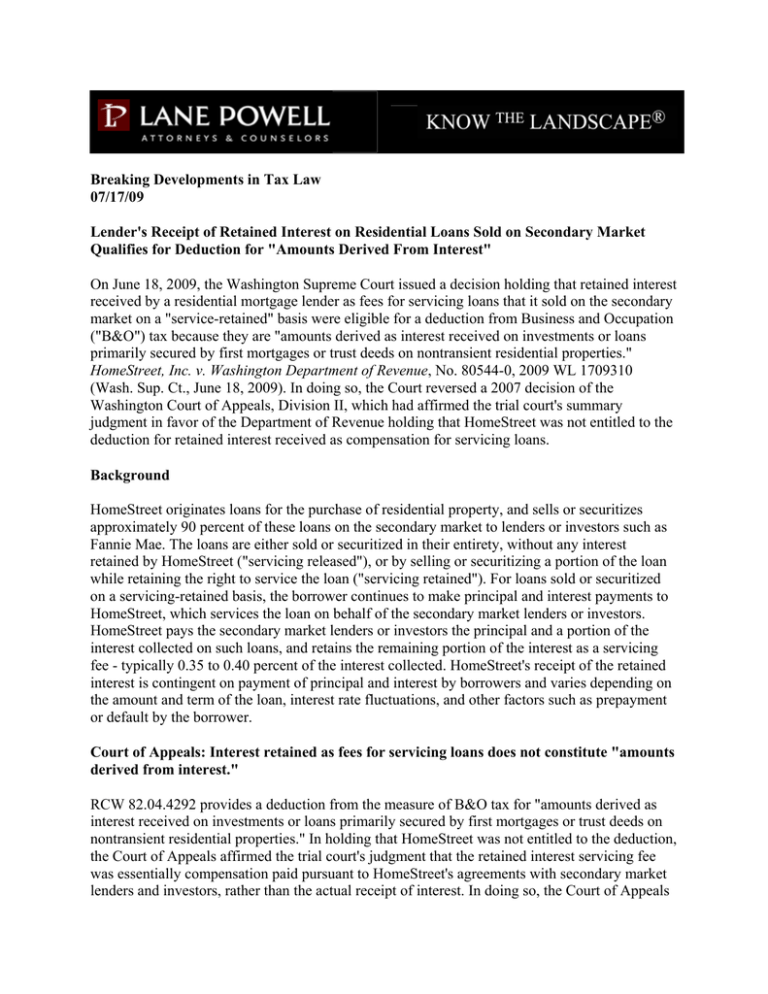Breaking Developments in Tax Law 07/17/09
advertisement

Breaking Developments in Tax Law 07/17/09 Lender's Receipt of Retained Interest on Residential Loans Sold on Secondary Market Qualifies for Deduction for "Amounts Derived From Interest" On June 18, 2009, the Washington Supreme Court issued a decision holding that retained interest received by a residential mortgage lender as fees for servicing loans that it sold on the secondary market on a "service-retained" basis were eligible for a deduction from Business and Occupation ("B&O") tax because they are "amounts derived as interest received on investments or loans primarily secured by first mortgages or trust deeds on nontransient residential properties." HomeStreet, Inc. v. Washington Department of Revenue, No. 80544-0, 2009 WL 1709310 (Wash. Sup. Ct., June 18, 2009). In doing so, the Court reversed a 2007 decision of the Washington Court of Appeals, Division II, which had affirmed the trial court's summary judgment in favor of the Department of Revenue holding that HomeStreet was not entitled to the deduction for retained interest received as compensation for servicing loans. Background HomeStreet originates loans for the purchase of residential property, and sells or securitizes approximately 90 percent of these loans on the secondary market to lenders or investors such as Fannie Mae. The loans are either sold or securitized in their entirety, without any interest retained by HomeStreet ("servicing released"), or by selling or securitizing a portion of the loan while retaining the right to service the loan ("servicing retained"). For loans sold or securitized on a servicing-retained basis, the borrower continues to make principal and interest payments to HomeStreet, which services the loan on behalf of the secondary market lenders or investors. HomeStreet pays the secondary market lenders or investors the principal and a portion of the interest collected on such loans, and retains the remaining portion of the interest as a servicing fee - typically 0.35 to 0.40 percent of the interest collected. HomeStreet's receipt of the retained interest is contingent on payment of principal and interest by borrowers and varies depending on the amount and term of the loan, interest rate fluctuations, and other factors such as prepayment or default by the borrower. Court of Appeals: Interest retained as fees for servicing loans does not constitute "amounts derived from interest." RCW 82.04.4292 provides a deduction from the measure of B&O tax for "amounts derived as interest received on investments or loans primarily secured by first mortgages or trust deeds on nontransient residential properties." In holding that HomeStreet was not entitled to the deduction, the Court of Appeals affirmed the trial court's judgment that the retained interest servicing fee was essentially compensation paid pursuant to HomeStreet's agreements with secondary market lenders and investors, rather than the actual receipt of interest. In doing so, the Court of Appeals reasoned that "interest" is defined as payments received in exchange for the use of capital, and since HomeStreet had already received the full amount of its capital for the loans it sold on the secondary market, the servicing fees did not constitute interest for purposes of the deduction. Supreme Court: Retained interest, received as fees for services or otherwise, does constitute "amounts derived from interest." In a majority decision, the Supreme Court reversed the Court of Appeals, holding that "[u]nder the plain meaning of RCW 82.04.4292 tax deductions are allowed for ‘amounts derived from interest,' and the amount HomeStreet retained when servicing the loans is derived from the interest of the loans." In arriving at this conclusion, the analysis of the Supreme Court followed a decidedly different approach than the one taken by the Court of Appeals. While the Court of Appeals' decision turned on the fact that HomeStreet no longer "owned" the loans and the characterization of the amounts received as fees for services rather than interest per se, the Supreme Court's analysis focuses on the plain language of the statute and the fact that amounts received were taken from the stream of interest generated by the loans serviced by HomeStreet. In the Supreme Court's view, the statutory term "amounts derived from interest" was unambiguous and merely required that the amounts received be derived from interest, which in its view did not operate to the exclusion of interest retained as a servicing fee. The Supreme Court rejected the Department of Revenue's argument that the statute must be narrowly construed given the plain meaning of the statutory language, the Court concluded that it was unnecessary to construe the meaning of the statute by inquiring into the legislature's intent when enacting the deduction, or to examine the characterization of the amounts received as fees for services versus the receipt of interest. What This Means for Mortgage Lenders Under the Court of Appeals' decision, lenders were essentially foreclosed from taking the deduction with respect to amounts derived from interest on loans that they sold or securitized on the secondary market, which in most instances would limit the deduction to a relatively small portion of the total portfolio of loans originated by a lender. By contrast, the Supreme Court's decision should entitle lenders to take the deduction for any amounts derived from the stream of interest generated by and received on investments or loans primarily secured by first mortgages or trust deeds on residential properties, including loans that are sold or securitized on the secondary market on a service-retained basis. For more information, please contact the Tax Law Practice Group at Lane Powell: 206.223.7000 Seattle 503.778.2100 Portland taxlaw@lanepowell.com www.lanepowell.com 2 We provide the Tax Law Hotsheet as a service to our clients, colleagues and friends. It is intended to be a source of general information, not an opinion or legal advice on any specific situation, and does not create an attorney-client relationship with our readers. If you would like more information regarding whether we may assist you in any particular matter, please contact one of our lawyers, using care not to provide us any confidential information until we have notified you in writing that there are no conflicts of interest and that we have agreed to represent you on the specific matter that is the subject of your inquiry. Copyright © 2009 Lane Powell PC www.lanepowell.com Seattle - Portland - Anchorage - Olympia - Tacoma - London 3
